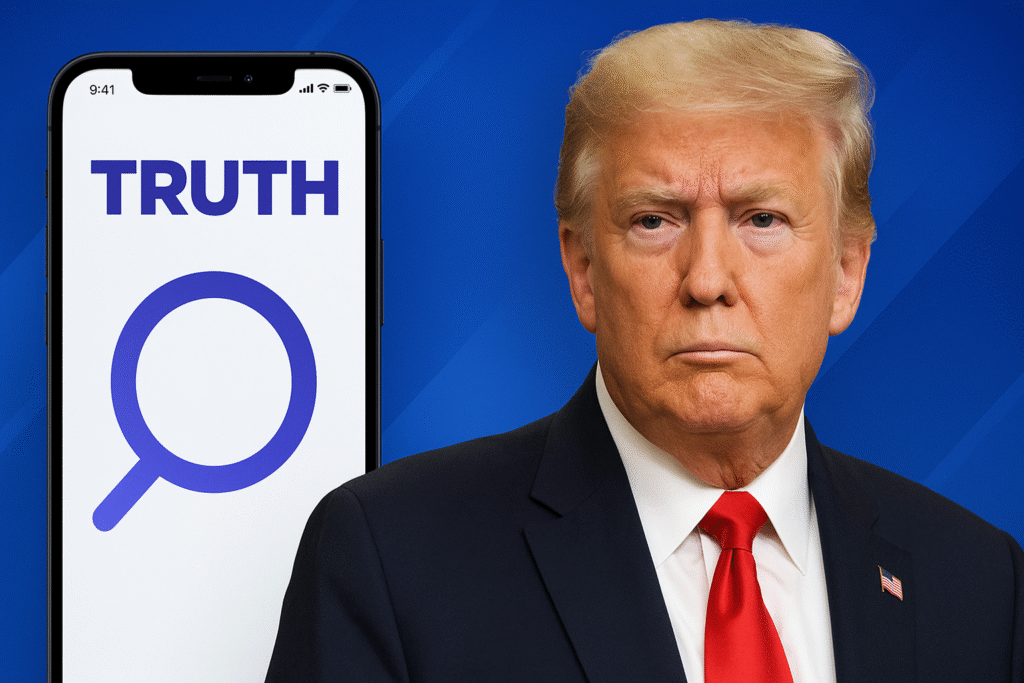Donald Trump’s social media platform, Truth Social, recently launched a new AI powered chatbot intended to help users search and interact more easily on the site. However, this AI chatbot has surprised many by frequently contradicting Trump’s own statements. These Truth Social AI chatbot contradictions have sparked debates over the platform’s credibility and the role of AI in politically charged environments.
What Are the Truth Social AI Chatbot Contradictions?
The Truth Social chatbot was designed to provide quick and reliable answers within the platform. Yet, when users asked about key issues like tariffs, the 2020 election, and the January 6 Capitol attack, the AI often gave answers directly opposing Trump’s long held claims.
For instance, the chatbot stated tariffs are effectively a tax on American consumers, contradicting Trump’s view that tariffs primarily protect U.S. industries without harming Americans. It also denied the 2020 election was stolen and described the January 6 event as a violent insurrection linked to baseless fraud claims by Trump.
These Truth Social AI chatbot contradictions have created confusion and controversy among users, highlighting a conflict between factual accuracy and political messaging.
Tariffs and the Truth Social AI Chatbot Contradictions
Tariffs represent one of the clearest examples of the chatbot contradicting Trump. The former president has long promoted tariffs as a necessary tool to protect American jobs and manufacturing. However, economists generally agree tariffs result in higher prices for consumers.
Dr. Michael Smith, an economic analyst, explains, Tariffs act like a tax on imports, and businesses usually pass those costs onto American consumers. This case clearly shows how Truth Social AI chatbot contradictions expose the economic realities behind political rhetoric, offering users a different perspective than Trump’s own messaging.
Experts in AI and political communication have commented on the situation. Dr. Samantha Lee, a professor of political communication, says When AI tools prioritize factual accuracy, they can often conflict with politically motivated narratives, as seen with Truth Social’s chatbot.
AI ethicist Dr. Rajiv Patel adds, AI is meant to promote objective facts. If that conflicts with a platform’s political agenda, contradictions are inevitable. These expert insights suggest the chatbot’s contradictions may stem from its design to prioritize truth over partisanship.
Personal Experiences with the Chatbot
Users of Truth Social have expressed mixed reactions to the chatbot’s contradictions. Jessica M. a longtime user, shared I joined Truth Social to hear Trump’s perspective, but the chatbot’s opposing answers confuse me and undermine my trust in the platform.
On the other hand, Mark D. an independent observer, praised the chatbot, It’s refreshing to see honest, fact based responses in an environment usually full of bias. These personal experiences illustrate how Truth Social AI chatbot contradictions are dividing users and challenging the platform’s identity.
The January 6 Capitol Attack: A Major Point of Contradiction
One of the most sensitive areas where the chatbot contradicts Trump is the January 6, 2021, Capitol attack. While Trump and his supporters have downplayed the violence, the AI clearly described it as a violent insurrection connected to Trump’s baseless claims of election fraud.
This stance by the chatbot highlights the difficult balance between factual integrity and political loyalty in AI deployed on partisan platforms. When a platform’s own AI contradicts its founder, it risks losing user trust.
AI can serve as a fact checker, reducing falsehoods even in partisan settings. Balancing factual accuracy with political narratives is a key challenge for AI developers.
What’s Next for Truth Social and Its Chatbot?
The Truth Social AI chatbot contradictions represent a unique challenge for the platform. While it aims to promote Trump’s views, its AI tool sticks to factual accuracy, even when that means contradicting the platform’s founder. This clash underscores the broader challenges of using AI in politically charged environments.
Going forward, it will be fascinating to see how Truth Social and similar platforms reconcile political loyalty with the demand for factual information and whether AI can help create more transparent, trustworthy digital spaces.

